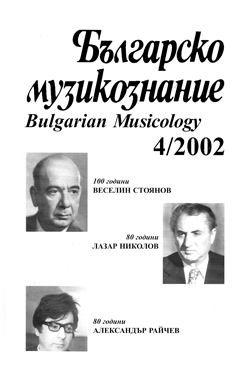Поетиката на Лазар Николов и традициите в мисленето за дванадесеттоновата композиция в Западна Европа
The Poetics of Lazar Nikolov and the Traditions in Thinking of the Twelve-Tone Composition in West Europe
Author(s): Angelina PetrovaSubject(s): Music
Published by: Институт за изследване на изкуствата, Българска академия на науките
Summary/Abstract: The correlation of twelve-tone music - serial vanguard is an area, in which the most radical changes in the aesthetics and composition of XX century occurred. The poetics of Lazar Nikolov situated itself in the opposition 12-tone tradition - serialism, it set its position here, its definitions of certain aesthetic categories. The study of Lazar Nikolov’s 12-tone poetics by necessity interprets the difference between the phenomena of East European and West European vanguard trends. Symptomatically in the Bulgarian 12-tone composition we can talk about the crossroads of traditions: the great symphonic genres have developed in it, but a new, vanguard twelve-tone style has arisen as well. In an artistic and socio-cultural aspect the field of Bulgarian twelve-tone music means a “third area”, a place where the intersection of traditions - both of the 12-tone music form the first half of XX century and of the serialism, gives rise to an aesthetics of opposition against the ideological dictate, against officiously replaced cultural values. Lazar Nikolov defined himself in the aesthetic situation of the 1950s in Bulgaria through the concept of pure or absolute music. The concept was introduced in the same way he had adopted it from the West European aesthetic tradition from the beginning of the century: with the term “pure or absolute music”. Lazar Nikolov’s conception of pure music confronts to some extent with the wrong interpretation of “l’art pour l’art” in serialism. There abstraction is something different, it has become the only medium, it exhausts the entire content of the aesthetic. There are some common grounds in the poetics of Lazar Nikolov with the interpretation l’art pour I’art and serialism, but he did not accept the dictate of the construction by itself as a moment that exhausts all contents of the aesthetic message. From the above stated we understand that the idea of pure music is something which is his view is opposed to the repressive metaphors of progress. One of the codes, which differentiate him in the context of the second half of the century, was his connection with the tradition of expressionism. We have to take into consideration all the complexity, meta phoprism and multi-layers of the poetic conception of Lazar Nikolov. He himself, as late as in the 1980s, defined his music and his works as “athematic”. Now the principle of metamorphosis rather means a moment of merging the aspects of pitch, rhythm, timbre, dynamic. Consequently, here the sound matter and its development are transferred into a free territory where the associative, the metaphoric and the logically structural lose their clear outlines. The logic of metamorphosing now is being sought in merging the sensory with the associative, the metaphor and music structure.
Journal: Българско музикознание
- Issue Year: 2002
- Issue No: 4
- Page Range: 3-37
- Page Count: 35
- Content File-PDF

